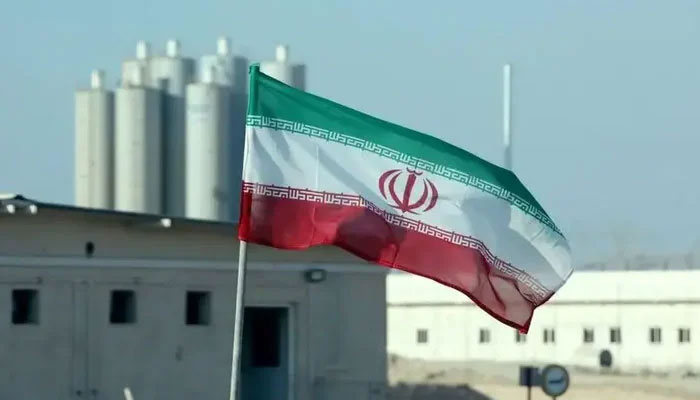Iran may end nuclear arms ban if sanctions reimposed
Iran is set to meet with Britain, France and Germany for talks on its nuclear programme on Friday
TEHRAN: Iran could end its ban on acquiring nuclear weapons if Western sanctions are reimposed, its top diplomat told The Guardian in an interview published Thursday ahead of talks on the matter.
Iran is set to meet with Britain, France and Germany for talks on its nuclear programme on Friday after the three governments joined with the United States to have Tehran censured by the UN atomic watchdog.
Last week’s chiding prompted a defiant response from Tehran, but its officials have since signalled willingness to engage with others ahead of the return of US president-elect Donald Trump, whose last administration pursued a policy of “maximum pressure” against the Islamic republic.
Iran insists on its right to nuclear energy for peaceful purposes, but according to UN’s International Atomic Energy Agency (IAEA), it is the only non-nuclear-weapon state enriching uranium to 60 percent.
In an interview published on the eve of the talks, Foreign Minister Abbas Araghchi warned frustration in Tehran over unmet commitments, such as lifting sanctions, was fuelling debate on whether the country should alter its nuclear policy. “We have no intention to go further than 60 percent for the time being, and this is our determination right now,” he told Britain’s The Guardian newspaper. But, he added, “there is this debate going on in Iran, and mostly among the elites... whether we should change our nuclear doctrine” as so far it has proven to be “insufficient in practice”. The 2015 nuclear deal between Tehran and major powers aimed to give Iran relief from crippling Western sanctions in exchange for limiting its nuclear programme to prevent it from developing a weapons capability. Tehran has consistently denied any intention of pursuing atomic weapons.
Tehran’s willingness to sit down with the three European governments so soon after the censure comes just weeks before Trump is set to return to the White House.During his first term, Trump focused on reimposing heavy sanctions on Iran following his administration’s unilateral withdrawal from the 2015 deal three years after it was agreed.In retaliation for the US withdrawal, Tehran reduced its compliance with the deal, raising its uranium enrichment levels to 60 percent -- close to the 90 percent required for a nuclear bomb. Under the 2015 accord -- which will expire in October 2025 -- Iran’s enrichment was capped at 3.67 percent.
Supreme leader Ayatollah Ali Khamenei, who has the final authority in Iran’s decision-making, has issued a religious decree, or fatwa, prohibiting atomic weapons. Iranian diplomat Majid Takht-Ravanchi, who serves as the political deputy to Araghchi, is scheduled to represent Iran in Friday’s talks. He will meet beforehand with Enrique Mora, deputy secretary general of the European Union’s foreign affairs arm, according to the IRNA state news agency.
For Tehran, the goal of the talks on Friday is to avoid a “double disaster” scenario, in which it would face renewed pressures from both Trump and European nations, according to political analyst Mostafa Shirmohammadi. He noted that Iran’s support among European governments had been eroded by allegations it offered military assistance for Russia’s invasion of Ukraine. Iran has denied these accusations and hopes to mend relations with Europe, while also maintaining a firm stance.
-
 Meghan Markle, Prince Harry Friends Suggest Their Marriage 'isn't All It Seems'
Meghan Markle, Prince Harry Friends Suggest Their Marriage 'isn't All It Seems' -
 Andrew Handed Out 'classified' Information To Jeffrey Epstein
Andrew Handed Out 'classified' Information To Jeffrey Epstein -
 Margot Robbie Recalls Wild Party Days And Getting Kicked Out Of Clubs
Margot Robbie Recalls Wild Party Days And Getting Kicked Out Of Clubs -
 NASA's Hubble Space Telescope Discovers ‘Dracula Disk', 40 Times Bigger Than Solar System
NASA's Hubble Space Telescope Discovers ‘Dracula Disk', 40 Times Bigger Than Solar System -
 Annular Solar Eclipse 2026: Where And How To Watch ‘ring Of Fire’
Annular Solar Eclipse 2026: Where And How To Watch ‘ring Of Fire’ -
 Zayn Malik Explains Past Comments About Not Being In Love With Gigi Hadid
Zayn Malik Explains Past Comments About Not Being In Love With Gigi Hadid -
 Internet Reacts To 10 Days Flight Ban Over El Paso
Internet Reacts To 10 Days Flight Ban Over El Paso -
 YouTube Music Tests AI-powered ‘Your Week’ Recap To Summarise Listening Habits
YouTube Music Tests AI-powered ‘Your Week’ Recap To Summarise Listening Habits -
 Kelly Clarkson Ready To Date After Talk Show Exit?
Kelly Clarkson Ready To Date After Talk Show Exit? -
 Is AI Heading Into Dangerous Territory? Experts Warn Of Alarming New Trends
Is AI Heading Into Dangerous Territory? Experts Warn Of Alarming New Trends -
 Google Updates Search Tools To Simplify Removal Of Non-consensual Explicit Images
Google Updates Search Tools To Simplify Removal Of Non-consensual Explicit Images -
 Chilling Details Emerge On Jeffrey Epstein’s Parties: Satanic Rights Were Held & People Died In Rough Intimacy
Chilling Details Emerge On Jeffrey Epstein’s Parties: Satanic Rights Were Held & People Died In Rough Intimacy -
 50 Cent Gets Standing Ovation From Eminem In New 'award Video'
50 Cent Gets Standing Ovation From Eminem In New 'award Video' -
 Bad Bunny Delivers Sharp Message To Authorities In Super Bowl Halftime Show
Bad Bunny Delivers Sharp Message To Authorities In Super Bowl Halftime Show -
 Prince William 'worst Nightmare' Becomes Reality
Prince William 'worst Nightmare' Becomes Reality -
 Thai School Shooting: Gunman Opened Fire At School In Southern Thailand Holding Teachers, Students Hostage
Thai School Shooting: Gunman Opened Fire At School In Southern Thailand Holding Teachers, Students Hostage




